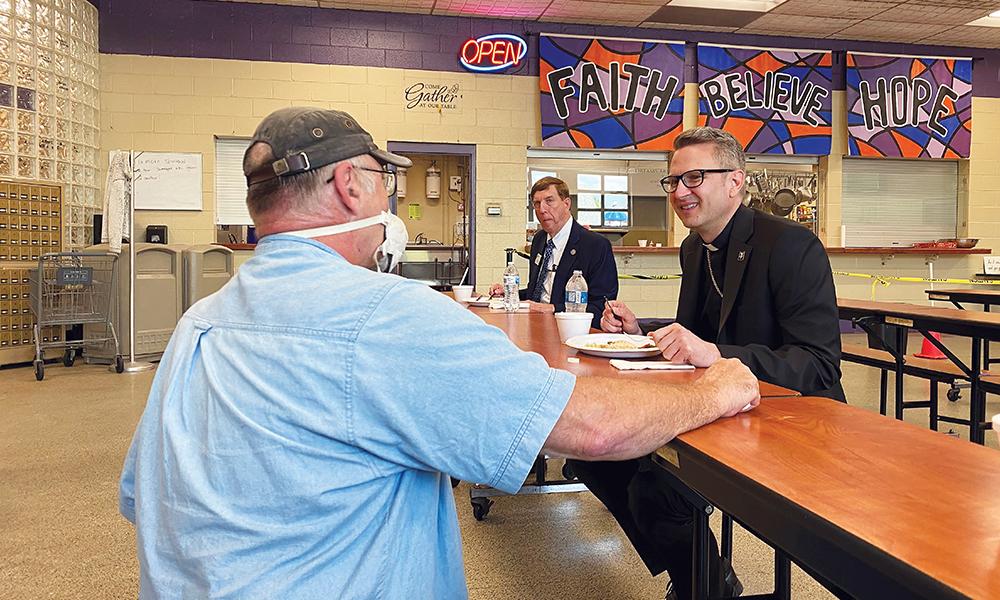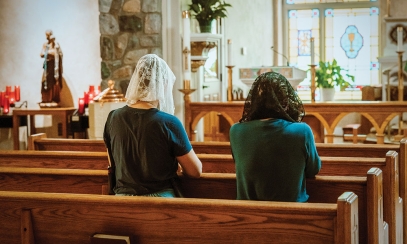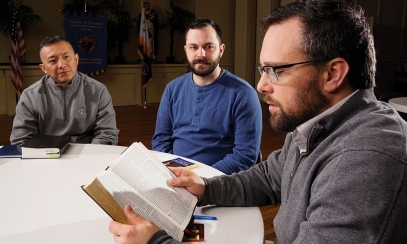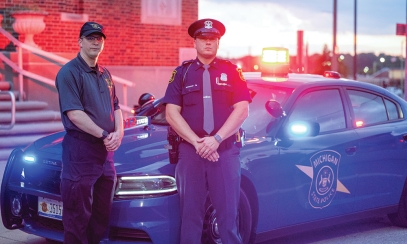
Getting to Know Bishop Ronald A. Hicks
Bishop Ronald A. Hicks will be installed on Sept. 29 at the Cathedral of St. Raymond Nonnatus. Christ is our Hope will be covering his installation Mass in the October issue. In the meantime, to continue to introduce the diocese’s sixth bishop, the magazine wanted to share some answers Bishop Hicks gave during recent conversations he had with Carlos Briceño, the editor of the magazine, and Bishop Richard E. Pates, the diocesan apostolic administrator.
Speaking Spanish and understanding the Hispanic culture are of great interest to Bishop Hicks. Most of his formative learning occurred during interactions with Nuestros Pequeños Hermanos (NPH), which is Spanish for “Our Little Brothers and Sisters.” NPH is a home dedicated to caring for more than 3,400 orphaned and abandoned children in nine Latin American and Caribbean countries. He spent a year with the organization as a young adult in Mexico. Then, after becoming a priest, in July 2005, with Cardinal Francis George’s permission, Bishop Hicks moved from Chicago to El Salvador and began a five-year term as regional director of NPH in Central America.
Bishop Hicks: Learning Spanish has been a beautiful gift that has opened up not only the culture, but the ministry and the people. I remember being in the college seminary. My very first year, I was assigned during the school year to teach religious education to second graders at a parish in Chicago that was predominantly Hispanic. I taught all my classes in English. I still remember the day of their Communion. I wanted to talk and interact with their parents. To get to know who is the mother and father of “Jose” who acts this way, or of “Maria” who acts that way. Just to get to know them.
I was struck at that moment, at that first Holy Communion, of the wall, the barrier that existed. I knew about six words of Spanish. And I just thought, “I don't like having this barrier.” I kept that in the back of my mind. Learn Spanish if I can.
On the day that he visited the Diocese of Joliet after it was announced that he was going to be the diocese’s next bishop, Bishop Hicks wore a little photo of Saint Óscar Romero, the archbishop of San Salvador who was assassinated in 1980 while celebrating Mass, on the lapel of his jacket. He sees Saint Romero as one of his spiritual heroes, especially for his love for the poor, but he was also asked who his other spiritual heroes are.
Bishop Hicks: The saints and Mary, our mother. Her love for us and my love for her is so strong. The saints have a different way of speaking to us. I turn to them in so many different circumstances. One of my favorites is St. John Vianney. I'm born on his feast day, Aug. 4. He is someone whose path to holiness and sainthood wasn't a straight line. They wanted to kick him out of seminary because he wasn’t quite smart enough, yet God used his gifts to do extraordinary work and bring people closer to God. So, I look at people like that, they inspire me. When I do the Office of Readings, I always enjoy when there is something from St. Augustine or St. John Chrysostom. There is such a clarity of how they open up the faith. I also like preaching a lot. Preaching has been a real joy to me in priesthood. I’m always looking for ways to of being solid with the theology, while also trying to explain it in a creative and understandable way. Those are two great examples of saints who were able to do that for us.
Bishop Hicks was also asked about his leadership style.
Bishop Hicks: I have a pastoral heart. The leadership style is one of a pastor who tries to be a spiritual father, a collaborator, a listener. I know how to make decisions, but I seek input before doing so. I've been told that I have a gentle spirit, yet I'm able to also be strong and to try to set vision and agendas and make sure that they move forward. I'm efficient with time and highly organized. I also enjoy being with people. Some people are surprised when they heard that I'm an introvert. I recharge by myself and also with the Lord in quiet prayer. But I also love people. I just have to recognize that after spending time with a lot of people my internal batteries need recharging.
He’s also a big admirer of Pope Francis, and, in a world that is often divisive, Bishop Hicks talked about the need for unity.
Bishop Hicks: The more we, as Catholics, as Christians, can be united [the better]. We're living in a world that is secularizing so quickly. The message and the core of Jesus and the Eucharist and the Sacraments are more necessary and more important now than ever. We need to look for ways of evangelizing and spreading the Good News, and realizing that, when you do, it's a road to happiness. There's joy by being a member of this Church, by loving Jesus and by putting our faith into action.
He also talked about his love for Jesus.
Bishop Hicks: My hope is simply to be someone who listens, respects and also leads and guides as a Good Shepherd, a spiritual father, and also someone who can look for ways of organizing us in the best possible way. But, at the same time, we need to make sure that Christ is at the center of our lives. I love Jesus. The reason I'm a priest, the reason I'm a bishop, the reason I'm Catholic is because I love Jesus. I've been baptized, and as a baptized Catholic I want to continue to evangelize and to make sure the faith is growing, and that it is not only growing for a certain segment but for everyone – for young people, for the elderly, for those of us who may be in the middle. Jesus should be the center of our lives, and I'm very excited about looking for ways of continuing to bring Christ and God in the center.
Bishop Emeritus R. Daniel Conlon wrote a pastoral letter in 2018 about the need for this diocese to become full of missionary disciples.
Bishop Hicks was asked about how his experiences in the Archdiocese of Chicago with the Renew My Church movement there influence and impact the movement started here toward missionary discipleship.
Bishop Hicks: The question about “Renew My Church” in Chicago is a good one. Every diocese is unique. We recognized that Chicago needed some structural renewal and to look at how many parishes we have and at our resources for not only finance, but also for priests and personnel. Renew My Church uses a process that it's not just decisions made from the top, but really try to get input from all involved. There's no perfect process. It's hard when you consider a merger at a parish or a closure of a school.
We've been in need of that structural renewal. At the same time, I think one of the most significant gifts of “RMC” has been doing the structural renewal with the spiritual renewal. If it's just about some closures or mergers, that's not enough. If we've not brought more people to the Lord, if we've not gathered more people gathered around the Eucharist, if we've not had people on fire for their faith and want to attract others to it, why do the structural renewal? The spiritual side has to be there, too. When we're looking at missionary disciples, and we are not just opening our doors, saying people might want to come in if you want. It's going out and saying our faith is worth it. Looking for ways of sharing it and attracting it. There's many ways to try to do it and to try to inspire.
Our bottom line for Renew My Church is we want our parishes and our people to be alive and vibrant with the Holy Spirit, with Christ in the center, with a Eucharistic people who then go out and attract others and to go out and take care of the poor and to really put their faith into action.
With so many people anxious about the pandemic or worried about getting sick, or worried about the economic situation in their lives and in the country, Bishop Hicks was asked what message he wanted to convey to those folks?
Bishop Hick: My number one suggestion would be to never lose hope. We can't dismiss how challenging this pandemic has been. How for some, even more challenging than others, experiencing sickness and death and lack of work and some financial hardships. There's also isolation in keeping people separated from each other. It goes against who we are as humans. I am so grateful that we have gone through the process of re-opening our churches in a safe way, that has been gradual and incremental. We are going about the re-opening of the churches, so we can gather, we can receive the Eucharist, and we can approach the Sacraments again. I go back to the same message… Don't lose hope; the Lord is with us.
My other piece of advice is this: continue to ask God what is He asking us to learn from this? Are there some lessons to be learned? Maybe we should not go back to everything that was considered normal. Maybe we should come together at the family dinner table more frequently. Maybe we should be in church more consistently. Maybe we should take time to pray or help others instead of always being on a device or a machine. What lessons is God asking us to learn that we can come closer, not only to God, but also to each other?
With so much uncertainty going on in this country and around the world, Bishop Hicks was asked what gave him hope.
Bishop Hicks: Bishop [Richard] Pates [the diocesan apostolic administrator] and I were talking yesterday that one of the things – and this is in Bishop Conlon's letter – when we talk about missionary disciples, we have to make sure that we are paying attention to our younger generation. And we can’t assume that because they attend a Catholic school, or they went through religious education, or they attended Mass on Sunday, they will grow up as adults who are practicing their faith. We have to be very intentional about how we are sharing this beautiful faith with them. I have a desire to make sure that our faith in our Lord who was born, who died on the Cross, rose again and now shares His life with us is passed on from generation to generation. It's been happening for over 2,000 years. We have to continue, and we really have to be intentional about it.
So how does Bishop Hicks relax? What are some of his hobbies?
Bishop Hicks: During Covid, I have actually developed some cooking skills. I'm able to make a very delicious bucatini all'amatriciana, which is a type of pasta that I really like. Just being able to be able to cook a few dishes has been great. When I get the chance, I like to read. I also like to travel and experience new cultures. My greatest gift, however, is being able to spend some time with either my family or my friends.
He was also asked what were his favorite local sports teams, which is always a touchy subject because, if you like one team, you might make the opposing team’s fans a little bit annoyed.
Bishop Hicks: This is where the rubber meets the road, and people are going to decide if they like me or not. I'll be very honest. In my family, it was clear we’d be baptized Catholic and also be Cubs fans. I am a Cubs fan. And a Bears fan, and I do root for the Bulls and the Hawks. For me, being a Chicagoan, being here in Joliet, the sports teams are something we can share, and also share some of the rivalries.
I grew up playing baseball, basketball, and football. Soccer was the one sport that did not exist in my neighborhood when I was growing up. My five years living in El Salvador, I became a soccer fan, at least watching it. I enjoy it.
And, last but not least, it’s an understatement to say that he really looks forward to ministering as the next bishop of the diocese.
Bishop Hicks: I just want to say how humbled I am to receive this call to be the bishop of Joliet. How excited I am, too. It's an extraordinary diocese. I'm going to learn a lot about it. I'm looking forward to learning about it and ministering with so many wonderful people, and that includes the priests, the deacons and their wives, the religious women and men, and the lay people. There's so many of us who make up this Church. I look forward to getting to know everyone.



